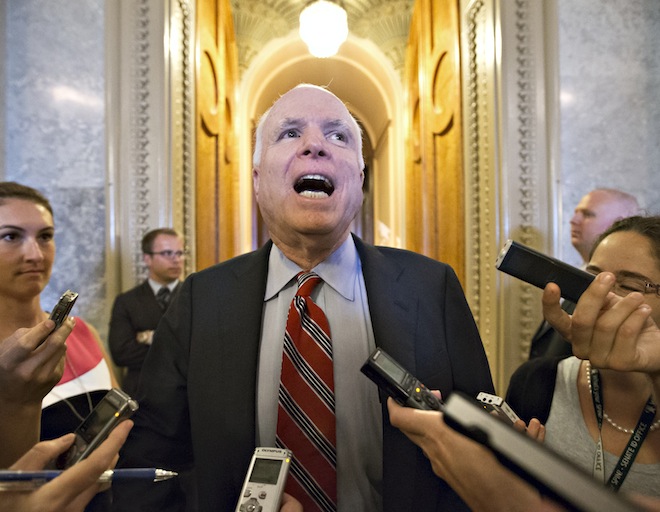There is increasing uncertainty about whether the Obama administration can muster the votes for authorization to launch air strikes in Syria, and two amendments co-sponsored by Sen. John McCain and approved by the Senate Foreign Relations Committee Wednesday underline how complicated it will be to appease competing factions in Congress.
McCain said Wednesday morning that he would not support the revised Syria resolution proposed by Sens. Robert Menendez (D-NJ) and Bob Corker (R-TN). Then after a four-hour private committee meeting that delayed the already scheduled committee business meeting, McCain introduced new language that would declare it U.S. policy to “change the momentum on the battlefield in Syria.” It passed through the committee on a voice vote, and the committee later approved the resolution 10-7, with one present vote from Sen. Ed Markey (D-MA).
McCain’s addition doesn’t quite say “regime change” — and the White House has said that would not be the purpose of military action — but it sounds a lot like regime change and describes a new government in Syria as the ultimate outcome. And with Congress already appearing uncomfortable voting for war, any language that seems to increase the likelihood of the United States getting entangled in a prolonged intervention is going to be met with skepticism.
It already made some Democrats on the committee wary. Sen. Chris Murphy (D-CT), one of two Democrats to vote against the resolution’s final passage, alluded to the McCain amendments in a statement explaining his vote.
“In the long-term, I worry that today’s authorization, which combines authorization for a military strike with support for the lethal arming of the opposition, will involve us in the Syrian conflict in a way that will be difficult to untangle,” Murphy said. “We are naïve to believe that our support for the opposition, or opposition to Assad, will end in a matter of months. Taking sides in this conflict will likely commit our country to an open-ended engagement, at an untold cost to both our reputation in the world and to American taxpayers.”
Sen. Tom Udall (D-NM), the other Democrat to oppose the resolution, expressed similar concerns in a statement on his vote.
“I am voting no because this policy moves the United States toward greater American conflict and increasing regional conflict,” Udall said. “We cannot guarantee that even a ‘surgical’ strike will prevent the United States from being embroiled in war.”
Another member of the Senate Democratic caucus, Bernie Sanders (I-VT), listed the appetite for regime change as one of his “serious reservations” about action in Syria in a statement released after the committee vote. While Sanders, arguably the most leftist member of the Senate, is hardly a hawk, he had previously said that he was keeping an open mind about Obama’s plan to intervene in Syria.
“I worry that while the president talks about ‘surgical strikes’ and a limited engagement by our military, there is no doubt that many members of Congress support ‘regime change’ in Syria and much deeper involvement,” Sanders said. “If that policy prevails, there is no question that it could cost tens of billions of dollars and the possible future involvement of American troops.”
The manner in which the McCain amendments passed suggests that the committee leadership wanted to allow them onto the resolution to gain McCain’s vote, which he gave despite his earlier protestations, without giving the new language too much heft. Some of language — “create favorable conditions” for a negotiated settlement in Syria, for example — seems intentionally fuzzy, and the statements are non-binding. As importantly, it was adopted on a voice vote, which carries much less symbolic value than a recorded vote in which members have to make their position known.
A Senate Democratic aide suggested as much to TPM.
“I think it plays into the notion that it doesn’t put members in a spot with a recorded vote,” the aide said. “It lets McCain say his peace without boxing others in.”
There is also the possibility that the resolution is amended on the Senate floor, and McCain’s amendments are removed. Menendez, the chairman of the Foreign Relations Committee, referenced the potential for general revisions when talking to reporters after the vote.
“The (Senate) leadership has a couple of opportunities here. They could offer a substitute and incorporate the views of members on both sides of the aisle, based on the foundation of what the committee did,” Menendez said. “They could permit amendments to be considered.”
Senate Majority Leader Harry Reid’s office did not have an immediate response to the committee’s vote.
So the policy implications of the McCain amendments are unclear at best. But the political factors in play seem evident: Menendez had to allow the McCain amendments to get his vote in what ended up being a narrow vote to approve the resolution. The Senate whip count on Syria is still muddled — 27 yes, 9 no and 63 decided, per TPM’s vote tracker; the numbers are much less optimistic in the House — so securing McCain’s allegiance after his prior waffling is a notable win for the White House and Senate leadership.
But it’s fair to wonder if bending over backward to appease McCain could complicate things with the rest of the Senate, given the early reactions from some Democrats.
One Senate Republican aide explained those apparent contradictions to TPM this way: “They don’t have the votes and are scrambling to get them.”
If that sounds like spin, when asked if the Senate had 60 votes to avoid any potential filibustering, Senate Majority Whip Dick Durbin (D-IL) told POLITICO after the meeting: “I don’t know.”









